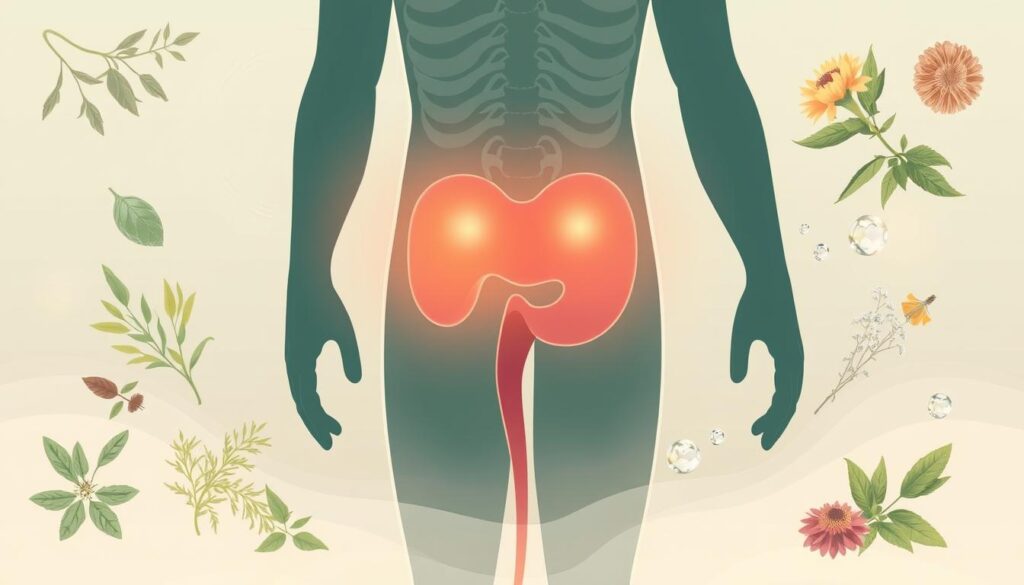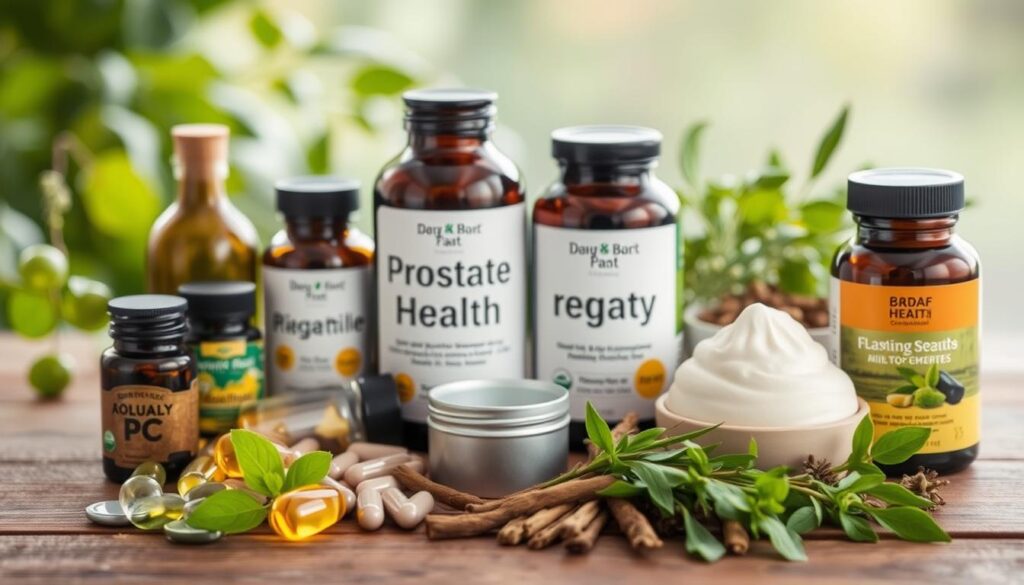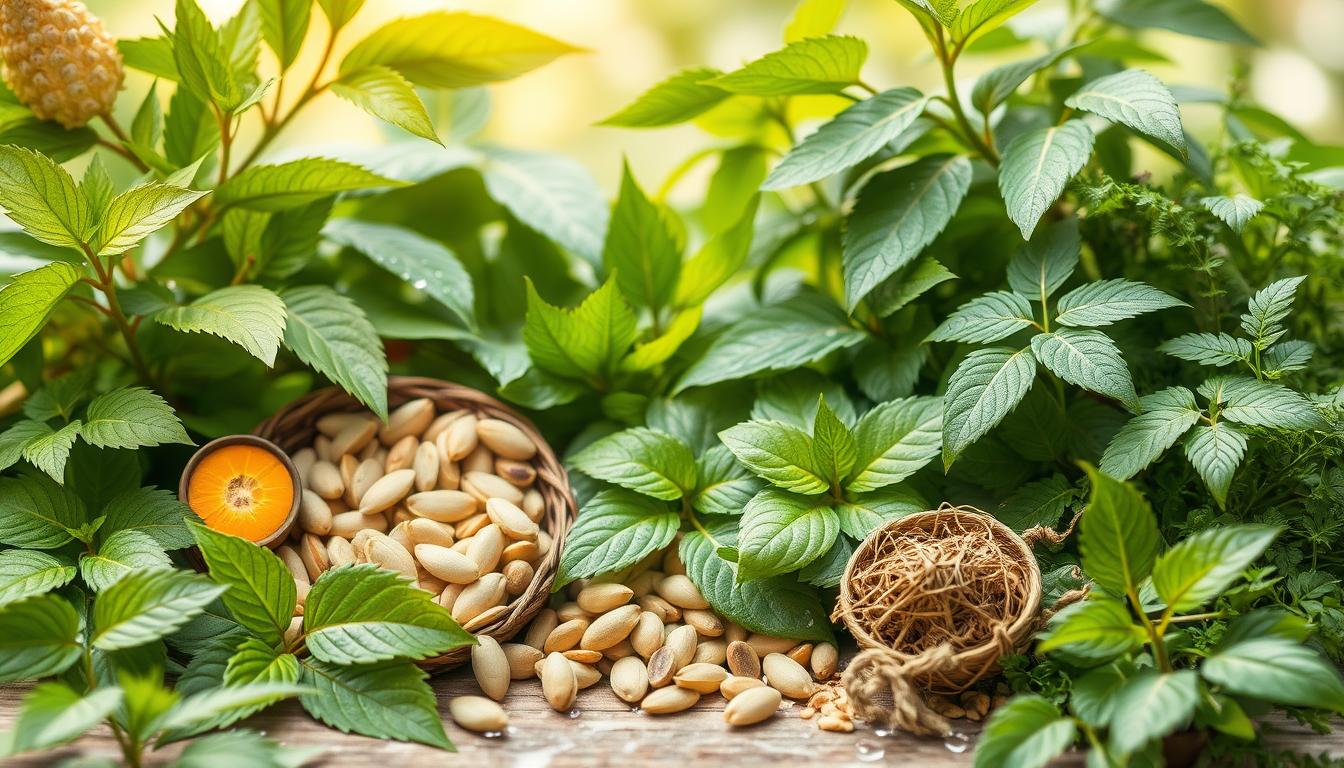As men age, an enlarged prostate, also known as benign prostatic hyperplasia (BPH), becomes a common health concern. While traditional medical treatments are available, many men are seeking natural solutions to manage this condition and improve their overall prostate health. This comprehensive guide will explore various natural methods that can help reduce an enlarged prostate, including dietary changes, herbal remedies, exercises, and lifestyle modifications.
Key Takeaways
- Explore natural solutions to manage an enlarged prostate without relying solely on medical interventions
- Understand the common signs and risk factors associated with prostate enlargement
- Discover dietary changes and supplements that can help shrink the prostate
- Learn about effective herbal remedies and alternative therapies for prostate relief
- Incorporate exercises and lifestyle modifications to support prostate health
Understanding Enlarged Prostate and Its Symptoms
An enlarged prostate, also known as benign prostatic hyperplasia (BPH), is a common condition that affects many men as they age. The prostate, a small gland located at the base of the bladder, can become enlarged over time, leading to a variety of symptoms that can impact one’s quality of life. Understanding the signs of an enlarged prostate and its underlying causes is crucial for seeking the right treatment and managing the condition effectively.
Common Signs of Prostate Enlargement
The most common symptoms of an enlarged prostate include:
- Frequent or urgent need to urinate, especially at night
- Difficulty starting or stopping the urine stream
- Weak or interrupted urine flow
- Feeling of incomplete bladder emptying
- Straining or pushing to urinate
- Increased risk of urinary tract infections
Risk Factors and Causes
The exact causes of an enlarged prostate are not fully understood, but several factors are known to increase the risk, including:
- Age: The prostate gland tends to grow larger as men get older, with the condition becoming more common after the age of 50.
- Hormonal changes: Fluctuations in hormone levels, particularly testosterone and estrogen, can contribute to prostate enlargement.
- Family history: Men with a close relative who has had an enlarged prostate are more likely to develop the condition themselves.
- Lifestyle factors: Obesity, lack of physical activity, and certain dietary habits may also play a role in prostate enlargement.
When to Seek Medical Attention
If you are experiencing any of the symptoms associated with an enlarged prostate, it is important to seek medical attention. A healthcare professional can perform a physical examination, order appropriate tests, and develop a personalized treatment plan to address your specific needs. Early diagnosis and management of an enlarged prostate can help prevent complications and improve overall quality of life.

“Prostate enlargement is a common condition, but it’s important to recognize the signs and seek medical attention if you’re experiencing any concerning symptoms.”
How to Reduce Enlarged Prostate Naturally
If you’re dealing with the common issue of an enlarged prostate, commonly known as benign prostatic hyperplasia (BPH), you’ll be pleased to know that there are natural ways to find relief. Rather than opting for invasive surgical procedures or relying solely on prescription medications, a holistic approach can effectively help reduce an enlarged prostate without harsh side effects.
One of the key natural methods for non-surgical prostate reduction is through dietary and lifestyle changes. By incorporating specific foods, supplements, and physical activities into your daily routine, you can support overall prostate health and potentially shrink an enlarged gland. Let’s explore some of the most effective natural therapies for BPH.
Dietary Modifications for Prostate Health
- Increase your intake of anti-inflammatory foods like fatty fish, nuts, and leafy greens.
- Limit your consumption of red meat, processed foods, and foods high in saturated fat, which can contribute to prostate inflammation.
- Incorporate soy-based products, such as tofu and tempeh, which contain compounds that may help reduce prostate size.
- Drink green tea regularly, as it’s rich in antioxidants that may help shrink the prostate.
Herbal Remedies for Prostate Relief
Several alternative therapies for BPH involve the use of specific herbs and natural supplements. Some of the most promising options include:
- Saw Palmetto: This herb has been extensively studied for its ability to reduce prostate size and alleviate urinary symptoms associated with an enlarged prostate.
- Pygeum: This African tree bark extract has been shown to improve urine flow and reduce prostate inflammation.
- Beta-sitosterol: This plant-based compound may help improve urinary function and reduce prostate size.
Remember, it’s always best to consult with a healthcare professional before starting any new supplements or herbal remedies, especially if you’re currently taking medication. They can help you develop a comprehensive plan to address your specific needs and ensure your safety.

Essential Dietary Changes for Prostate Health
Maintaining a healthy prostate is not just about medications – it starts with the foods we choose to nourish our bodies. Incorporating the right dietary changes can play a vital role in managing prostate issues and even helping to shrink an enlarged prostate.
Foods That Help Shrink the Prostate
- Tomatoes: Rich in the antioxidant lycopene, which has been shown to reduce prostate inflammation and promote prostate health.
- Broccoli and other cruciferous vegetables: Contain compounds like sulforaphane and indole-3-carbinol that may inhibit prostate tumor growth.
- Fatty fish: Salmon, mackerel, and sardines are high in omega-3 fatty acids, which can help reduce prostate inflammation.
- Pumpkin seeds: Contain zinc, an essential mineral for prostate function, as well as anti-inflammatory properties.
Foods to Avoid
While certain foods can benefit prostate health, others may contribute to prostate enlargement and inflammation. It’s best to limit your intake of the following:
- Processed meats: Sausages, deli meats, and bacon, which are high in saturated fats and preservatives that may promote prostate issues.
- Refined carbohydrates: White bread, pastries, and sugary snacks that can cause inflammation and hormonal imbalances.
- Alcohol: Excessive alcohol consumption has been linked to an increased risk of prostate enlargement and other urinary problems.
Recommended Supplements
In addition to a prostate-friendly diet, certain supplements may also help support prostate health and reduce an enlarged prostate. Some recommended supplements include:
| Supplement | Potential Benefits |
|---|---|
| Saw Palmetto | May help reduce prostate inflammation and improve urinary symptoms |
| Beta-sitosterol | May help shrink an enlarged prostate and improve urinary flow |
| Zinc | Essential for prostate function and may help reduce prostate inflammation |
By making strategic dietary changes and incorporating targeted supplements, men can take a proactive approach to maintaining a healthy prostate and addressing any enlargement or other issues. Remember, as with any health condition, it’s always best to consult with a healthcare professional before starting a new supplement regimen.

Powerful Herbal Remedies for Prostate Relief
If you’re seeking natural ways to manage an enlarged prostate, herbal remedies can be a potent ally. These plant-based treatments have been used for centuries to address prostate health concerns, often with promising results. Let’s explore some of the most powerful herbal options that may help reduce prostate enlargement and alleviate related symptoms.
Saw Palmetto
Saw palmetto is one of the most well-known and widely studied herbal remedies for prostate health. This berry-bearing palm tree native to the southeastern United States has been shown to inhibit the conversion of testosterone to dihydrotestosterone, a key factor in prostate enlargement. Many studies suggest saw palmetto can effectively relieve symptoms of an enlarged prostate, such as frequent urination and difficulty starting or stopping the urine stream.
Pygeum
Pygeum, derived from the bark of the African plum tree, is another popular herbal option for herbal prostate treatment. Pygeum contains active compounds that may help reduce inflammation and swelling in the prostate, leading to improved urinary function. Research indicates pygeum can be particularly beneficial for men with moderate to severe prostate enlargement.
Beta-Sitosterol
Beta-sitosterol, a plant-based compound found in a variety of foods and herbs, has also demonstrated potential for natural prostate remedies. Studies suggest beta-sitosterol can help improve urinary symptoms and flow in men with an enlarged prostate, likely by reducing inflammation and inhibiting the growth of prostate cells.
When incorporating these herbal remedies into your prostate health regimen, it’s important to follow dosage instructions and consult with a healthcare professional, especially if you are taking any medications. Herbal supplements can interact with certain drugs, so it’s crucial to ensure they are safe and appropriate for your individual needs.

“Herbal remedies can be a powerful addition to a comprehensive approach to managing an enlarged prostate, but they should not replace professional medical advice.”
Exercise and Physical Activity Benefits
Regular physical activity plays a crucial role in maintaining prostate health and managing the symptoms of an enlarged prostate. By incorporating targeted exercises and incorporating daily activities, individuals can experience significant improvements in their prostate function and overall well-being.
Kegel Exercises for Prostate Health
Kegel exercises, known for their ability to strengthen the pelvic floor muscles, have been shown to be particularly beneficial for those with an enlarged prostate. These exercises can help improve urinary control, reduce the frequency of urination, and even alleviate discomfort associated with prostate issues. To perform Kegel exercises, simply contract the muscles used to stop the flow of urine, hold for a few seconds, and then release.
Recommended Daily Activities
- Brisk walking: A simple yet effective exercise that can help improve circulation and reduce inflammation in the prostate gland.
- Swimming: A low-impact activity that can help strengthen the pelvic floor muscles and improve overall prostate function.
- Cycling: While cycling may not be recommended for those with severe prostate issues, moderate cycling can be beneficial for prostate health.
- Yoga: Certain yoga poses and stretches can help alleviate prostate-related discomfort and improve flexibility in the pelvic region.
By incorporating a combination of Kegel exercises and regular physical activities into your daily routine, you can take an active role in supporting your prostate health and reducing the symptoms of an enlarged prostate. Remember to consult with your healthcare provider to develop an exercise plan that best suits your individual needs and health conditions.
Lifestyle Modifications to Support Prostate Health
Making lifestyle changes can have a profound impact on managing enlarged prostate or benign prostatic hyperplasia (BPH) issues. By adopting a proactive approach, you can alleviate symptoms and promote overall prostate health. Let’s explore some practical lifestyle modifications that can support your journey towards a healthier prostate.
Stress Management Strategies
Chronic stress can exacerbate prostate problems. Incorporating stress management techniques into your daily routine can make a significant difference. Try practices like meditation, deep breathing exercises, or yoga to help reduce stress and anxiety levels. Engaging in relaxing activities, such as listening to soothing music or spending time in nature, can also be beneficial.
Prioritizing Quality Sleep
Adequate and quality sleep is crucial for overall health, including prostate well-being. Aim for 7-9 hours of sleep each night, and establish a consistent sleep routine. Avoid stimulants like caffeine or electronics close to bedtime, and create a peaceful sleep environment to promote better rest.
Avoiding Harmful Substances
Certain substances, such as alcohol and tobacco, can have a detrimental impact on prostate health. Limit or eliminate the consumption of these items to support your prostate’s well-being. Consider seeking support if you struggle with addiction or dependence on these substances.
Maintaining a Healthy Weight
Excess weight, particularly around the midsection, can contribute to prostate issues. Adopt a balanced diet rich in whole, nutrient-dense foods, and engage in regular physical activity to maintain a healthy weight. Consult with a healthcare professional to develop a personalized plan that suits your needs.
By implementing these lifestyle changes, you can take a proactive approach to managing enlarged prostate or BPH symptoms and promote overall prostate health. Remember, a holistic approach that combines dietary modifications, exercise, and stress management can be instrumental in improving your quality of life.
“Prioritizing your prostate health through lifestyle changes can make a significant difference in managing enlarged prostate or BPH issues.”
Alternative Therapies and Holistic Approaches
While traditional treatments for an enlarged prostate, such as medication and surgery, can be effective, some men may seek alternative therapies and holistic approaches to manage their condition. [https://healthytopix.com/] These alternative methods can offer a natural, non-surgical solution for reducing prostate size and improving urinary function.
Acupuncture Benefits
Acupuncture, a core component of traditional Chinese medicine, has shown promising results in addressing the symptoms of benign prostatic hyperplasia (BPH). By targeting specific meridian points, acupuncture may help to reduce prostate inflammation, improve urinary flow, and alleviate discomfort associated with an enlarged prostate.
Massage Techniques
Prostate massage, when performed by a trained professional, can be an effective way to promote prostate health and relieve BPH symptoms. This technique may help to improve circulation, reduce inflammation, and facilitate the drainage of fluids, leading to a gradual reduction in prostate size.
Meditation and Stress Management
Stress and anxiety can exacerbate the symptoms of an enlarged prostate. By incorporating meditation and other stress management practices into their routine, men with BPH may be able to alleviate discomfort and improve their overall quality of life. These holistic approaches can work in tandem with other alternative therapies for BPH and non-surgical prostate reduction methods.
| Alternative Therapy | Potential Benefits |
|---|---|
| Acupuncture | Reduces inflammation, improves urinary flow, alleviates discomfort |
| Prostate Massage | Improves circulation, reduces inflammation, facilitates fluid drainage |
| Meditation and Stress Management | Alleviates stress and anxiety, improves overall quality of life |
By incorporating a combination of alternative therapies and holistic approaches, men with an enlarged prostate can explore non-surgical prostate reduction options and potentially find relief from their BPH symptoms.
“Complementary and alternative therapies can be a valuable addition to traditional medical treatment for an enlarged prostate, providing a more comprehensive and personalized approach to managing this common condition.”
Scientific Evidence Behind Natural Treatments
The scientific community has extensively studied the potential benefits of natural remedies for prostate health. Studies have shown that prostate shrinking supplements containing key ingredients like lycopene, pumpkin seed extract, broccoli sprout extract, and pygeum can effectively reduce enlarged prostate and alleviate related symptoms.
Lycopene, a powerful antioxidant found in tomatoes, has been demonstrated to inhibit the growth of prostate cells and reduce inflammation in the prostate gland. Pumpkin seed extract has been found to block the conversion of testosterone to dihydrotestosterone, a hormone that contributes to prostate enlargement. Broccoli sprout extract, rich in sulforaphane, has shown promise in limiting prostate cell proliferation and promoting healthy prostate function.
Moreover, pygeum, an extract derived from the African plum tree, has been widely used in Europe to manage benign prostatic hyperplasia (BPH) symptoms. Clinical studies have revealed that pygeum can improve urine flow, reduce nighttime urination, and decrease other BPH-related issues.





